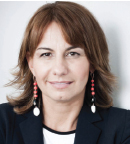“CheckMate 77T shows very promising results to support the use of perioperative nivolumab in resectable NSCLC,” said formal discussant Marina C. Garassino, MD, of the University of Chicago. “In particular, the trial demonstrated that patients could achieve incredible disease control rates. These findings are very encouraging for perioperative immunotherapy,” she added.

Marina C. Garassino, MD
“This is a practice-changing abstract,” Dr. -Garassino said. “Use of neoadjuvant chemoimmunotherapy followed by adjuvant immunotherapy builds on the current standard of care of neoadjuvant therapy followed by surgery.”
She continued: “These results are impressive, showing impressive hazard ratios, confidence intervals, and a highly statistically significant benefit in PD-L1–negative patients and all subgroups.”
Open Questions
However, there are some open questions, Dr. Garassino noted. Based on recent previous trials of perioperative regimens, she said she believes the currently studied immunotherapy/chemotherapy regimens are similar. She also stated the evidence supports treating stage II patients who have resectable disease after chemotherapy or chemoimmunotherapy. In addition, the evidence favors treating PD-L1–negative patients as well as those who are PD-L1–positive.
“The big remaining question is whether we need the adjuvant therapy. We don’t really know if the perioperative regimen is superior to neoadjuvant therapy alone. We do know that patients who achieve pathologic complete response do very well. For those who don’t achieve pathologic complete response, we need to run appropriate trials,” she said.
Dr. Garassino concluded: “The Checkmate 77T represents a new standard of care for patients with resectable NSCLC. We now have three possibilities in this setting—neoadjuvant therapy followed by surgery, surgery followed by adjuvant therapy, and now also perioperative therapy, which includes neoadjuvant therapy, surgery, and adjuvant therapy. Research in the future will address the added value of the adjuvant component in the perioperative setting, for those patients who achieve a complete pathologic response. Biomarkers, circulating tumor DNA, and artificial Intelligence will help to identify patients who are already cured with three cycles of chemotherapy and immunotherapy, but we need proper trials to address this issue.”
DISCLOSURE: Dr. Garassino has received personal and/or institutional financial support from AbbVie, Abion, AstraZeneca, Bayer, BeiGenius, Blueprint, BMS, -Boehringer Ingelheim Italia SpA, Celgene, Daiichi Sankyo, Eli Lilly, Foundation -Medicine, GlaxoSmithKline, Ignyta, Incyte, Janssen, MedImmune, Medscape, -Merck, Mirati, MSD, MSD International GmbH, Novartis, Oncohost, Pfizer, Pfizer (MISP), Regeneron, Roche, Sanofi, Seattle Genetics, Spectrum Pharmaceuticals, Takeda, and Tiziana; has relationships with AIFA, AIRC, Italian Moh, and -TRANSCAN; and has received research funding from Horizon 2020.

